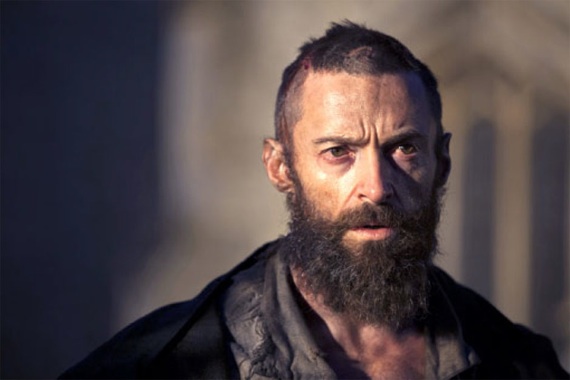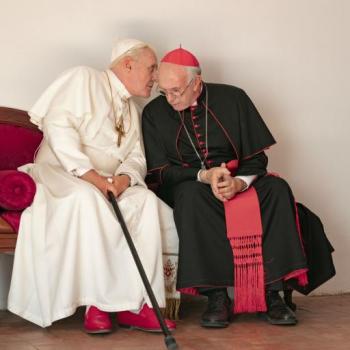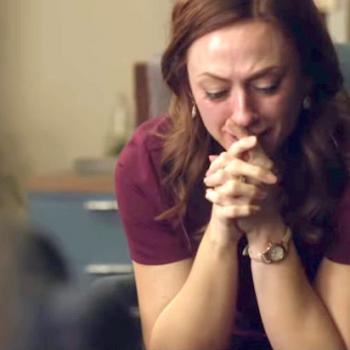At long last, I saw the movie version of “Les Miserables” tonight, tears dribbling off my cheeks and into my popcorn. I have long been smitten by the score, the story, the unabashed emotion of the piece, and the movie does justice to all of that. In fact, one of the things that struck me repeatedly is how the director Tom Hooper has treated the material with unfailing respect and deference; you might say that he has honored a theater work that is, among many things, about honor. The long, single-take musical performances are in fact perfectly in keeping with Hooper’s approach: he just lets the material speak for itself. To that end: no flashy editing tricks (as in “Chicago”) or heightened reality (as in “All That Jazz”) or glamour casting (“Evita”); he’s kept this a refreshingly straightforward, reality-based interpretation of the stage musical.
That reality is vivid: blood in the streets, shit in the sewers. No performance is complete without the singer sending a tear scurrying down his or her cheek. And the conceit of having all the singing done live pays off with performances that pack repeated emotional wallops. Every tremor, every quiver, every catch in the throat is there, and it echoes; you feel it all. I don’t think there was a bad performance in the ensemble, and a couple of them (Anne Hathaway, Hugh Jackman) are just breathtakingly good. Everything you’ve heard is true.
But here a few things you may not have heard:
- Religious imagery abounds. I can’t recall a recent movie with more depictions of crosses and crucifixes; they’re on walls, altars, tombstones. The movie is replete with Catholic iconography, and even Jackman’s Jean Valjean early on bears a striking resemblance to the battered and haunted Jesus of Jim Caviezel in “Passion of the Christ.”
- The factory where Fantine (Anne Hathaway) works is devoted to the manufacture of religious items – notably, rosaries. (In the stage musical, it’s never specified.) This makes a subtle, somewhat ironic and stinging point within the plot: Fantine is cruelly fired after refusing advances from the foreman, indicating a decidedly un-Christian streak in a Christian workplace. (I know: that’s just so implausible, isn’t it?)
- These are characters who are proud to pray. They repeatedly invoke God, mentioning things like grace, forgiveness, communion, the soul. In a sense, nearly every song is a kind of prayer—a pleading to God or an expression of deep spiritual yearning. The characters wear their hearts, and their souls, on their ragged and blood-spattered sleeves.
- This is a story, at bottom, about mercy. It is about second chances – from God, and from others—and the human capacity for reinvention. Jean Valjean becomes a new man, but it is only through the tender mercies of another—the bishop who (to paraphrase) “bought his soul for God.” Valjean seeks to extend that grace to others, and therein lies the rest of the story and the driving force of his life.
- Director Hooper has found inventive ways of re-imagining the material. Watch how he stages “Master of the House” (complete with a fornicating Father Christmas!) and note, too, the way he begins “I Dreamed a Dream,” as if it were a dream — with the tragic Fantine lying in bed, coming to grips with a dream that has become, by any measure, a nightmare.
- Finally, there is one more theme that pulses through the film: the shared struggles of the human family. In sum, we need one another. The movie reminds us of the transforming power of love – “to love another person is to see the face of God,” as the musical’s most famous lyric puts it – and how that love is shared, passed on, woven into our lives through acts of tenderness, courage, sacrifice and mercy. “Will you join in our crusade?,” the revolutionaries sing at the barricades. They aren’t just asking us to take up arms against injustice; they are crying out for a revolution of another kind, one that takes a stand against indifference and cruelty and hate. The show has a message that is not far removed from the gospel — a message of abiding love, sacrifice, redemption, even resurrection. (The show’s producer Cameron Macintosh was raised Catholic; whether he realizes it or not, I suspect the story’s message connected with him in a profound and visceral way.)
There’s a lot more to chew on. But see it for yourself. If you loved the stage musical, I suspect you’ll love the movie. If you’re unfamiliar with it, it may be an acquired taste. (In some ways, it improves on the stage production, by clarifying some muddy plot points and making more explicit what on stage was implicit; both my wife and I agreed that the movie was a lot easier to follow.) But I think it’s worth it. To surrender to the movie’s emotional pull is to rediscover in a grand way some values and virtues that many thought Hollywood had abandoned: things like faith, forgiveness, loyalty, courage, Christian love.
For a movie that concludes on a triumphant note of hope – “Tomorrow comes!” – that may be the most hopeful message of all.












